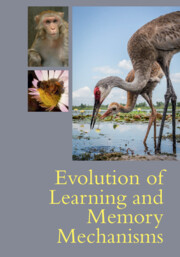Book contents
- Evolution of Learning and Memory Mechanisms
- Evolution of Learning and Memory Mechanisms
- Copyright page
- Contents
- Figures
- Tables
- Contributors
- Preface
- Introduction
- Part I Evolution of Learning Processes
- Part II Evolution of Memory Processes
- 16 The Evolution of Memory as an Immediate Perceptual Identification Mechanism
- 17 Episodic Memory in Animals
- 18 Evolutionary Origins of Complex Cognition
- 19 Evolution of Memory Systems in Animals
- 20 What Laboratory and Field Approaches Bring to Bear for Understanding the Evolution of Ursid Cognition
- 21 Distinguishing Mechanisms of Behavioral Inhibition and Self-control
- 22 Metacognitive Monitoring and Control in Monkeys
- 23 Adaptive Memory
- 24 Remembering Cheaters
- 25 Development of Memory Circuits under Epigenetic Regulation
- 26 Constraints on Learning and Memory
- Index
- References
21 - Distinguishing Mechanisms of Behavioral Inhibition and Self-control
from Part II - Evolution of Memory Processes
Published online by Cambridge University Press: 26 May 2022
- Evolution of Learning and Memory Mechanisms
- Evolution of Learning and Memory Mechanisms
- Copyright page
- Contents
- Figures
- Tables
- Contributors
- Preface
- Introduction
- Part I Evolution of Learning Processes
- Part II Evolution of Memory Processes
- 16 The Evolution of Memory as an Immediate Perceptual Identification Mechanism
- 17 Episodic Memory in Animals
- 18 Evolutionary Origins of Complex Cognition
- 19 Evolution of Memory Systems in Animals
- 20 What Laboratory and Field Approaches Bring to Bear for Understanding the Evolution of Ursid Cognition
- 21 Distinguishing Mechanisms of Behavioral Inhibition and Self-control
- 22 Metacognitive Monitoring and Control in Monkeys
- 23 Adaptive Memory
- 24 Remembering Cheaters
- 25 Development of Memory Circuits under Epigenetic Regulation
- 26 Constraints on Learning and Memory
- Index
- References
Summary
In this chapter, we explore the concept of self-control through a comparative and evolutionary perspective, we discuss how it is measured, and we outline the mechanisms that underlie this capacity (i.e., motivational factors, cognitive control, perception and learning, grit or perseverance, inhibition, as well as choice and commitment). An important concept addressed herein is the distinction between behavioral inhibition and self-control as related yet separate terms. In this endeavor, we briefly review tests of behavioral inhibition (e.g., the detour task, reverse reward contingency task) and self-control (working for more, intertemporal choice, delay of gratification, exchange, tool use, and sequenced travel tasks), outlining how these tasks shed light on the different mechanisms underlying inhibition versus self-control. We also discuss the role of control mechanisms within executive function tasks, such as the Stroop test, and how performance in these tasks is reflective of varying degrees of self-regulation and inhibition.
Keywords
- Type
- Chapter
- Information
- Evolution of Learning and Memory Mechanisms , pp. 375 - 391Publisher: Cambridge University PressPrint publication year: 2022

